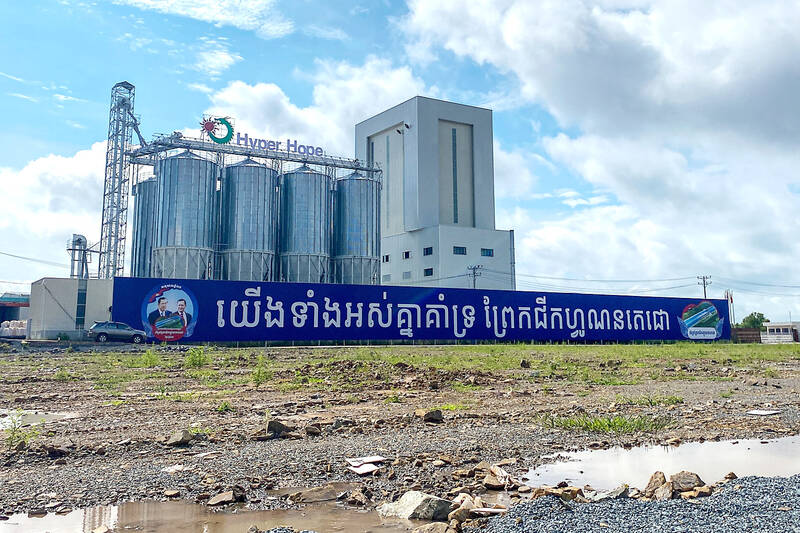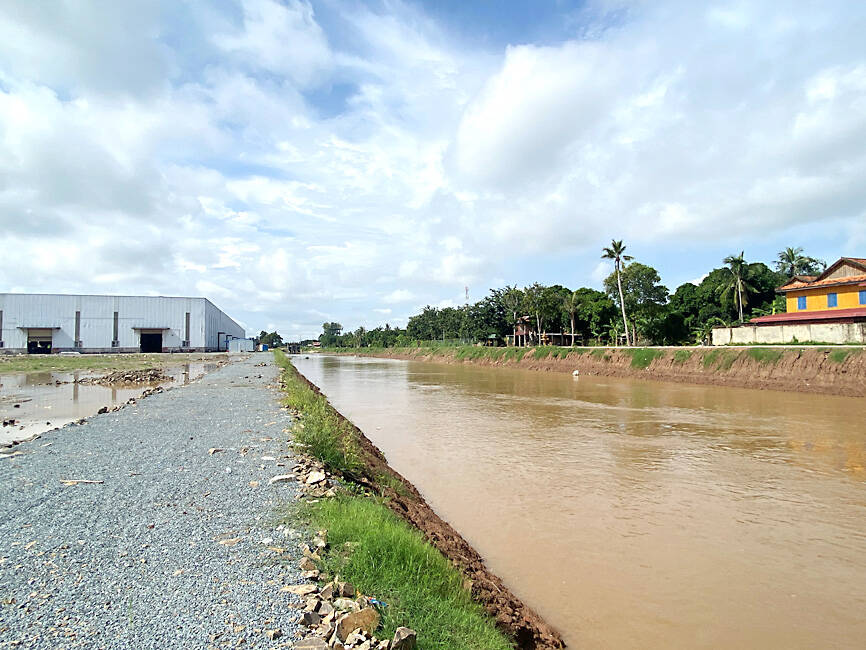At a ceremony in August, Cambodian Prime Minister Hun Manet knelt to receive blessings from saffron-robed monks as fireworks and balloons heralded the breaking of ground for a canal he hoped would transform his country’s economic fortunes.
Addressing hundreds of people waving the Cambodian flag, Hun Manet said China would contribute 49 percent to the funding of the Funan Techo Canal that would link the Mekong River to the Gulf of Thailand and reduce Cambodia’s shipping reliance on Vietnam.
Cambodia’s government estimates the strategic, if contentious, infrastructure project would cost US$1.7 billion, nearly 4 percent of the nation’s annual GDP.

Photo: Reuters
However, months later, China’s financial contribution remains in doubt.
Beijing has expressed misgivings about the project and has not made definitive commitments on its funding, four people directly involved in the investment plans or briefed about them said.
It underscores how Beijing is drastically downsizing its overseas investments as its domestic economic struggles, even in countries it considers strategic partners, such as Cambodia.

Photo: Reuters
Cambodia is widely seen by diplomats and foreign policy experts as a Chinese client state, owing to Beijing owning more than one-third of its total state debt.
However, Chinese investment in the Southeast Asian nation is now plunging, after a series of unsuccessful infrastructure projects, amid concerns over criminal gangs targeting Chinese nationals, and dropping tourist numbers.
The 180km canal would greatly expand an existing waterway and divert water from the fragile rice-growing Mekong Delta to the Gulf of Thailand, cutting Cambodian shipping through Vietnamese ports.
In the months after the Cambodian government in October last year signed an “investment framework agreement” with China Road and Bridge Corp (CRBC), a state-owned construction company, Cambodian officials went public about China’s financial involvement. The text of the deal is not public.
In an interview in May, the minister in charge of the project, Cambodian Deputy Prime Minister Sun Chanthol, said CRBC would develop the canal and “totally” cover its costs, getting a multi-decade concession in return.
However, at the August groundbreaking, the Hun Manet put CRBC’s share in the project at 49 per cent, with the remainder covered by Cambodian companies.
The same day, his father and former Cambodian prime minister Hun Sen in a statement on Facebook said that Japan would invest in the canal.
When asked last month about Cambodian assertions that CRBC would have a 49 percent stake, an official for the company said: “It’s very complicated,” without elaborating.
One person directly involved in the investment plans early this month said there was no Chinese money on the table at that stage.
A source from one of the Cambodian investors in the project said it would not be a surprise if China did not invest in the canal at all.
A fourth official briefed on the matter said China earlier this year had privately criticized Cambodian officials for announcing Chinese funding for the project that had not been decided.
They all declined to be named because of the issue’s sensitivity.
More than three months after the groundbreaking, the site of the ceremony on the bank of the Mekong is still abandoned.
Dithering over the canal comes as Chinese official development assistance to Cambodia, including infrastructure funding, is falling.
China’s disbursements to Cambodia are projected to drop to US$35 million in 2026 from more than US$420 million in 2021. There have been no new Chinese loans in the first half of this year, down from US$567 million in 2022 and US$302 million last year, official Cambodian data showed.
Chinese funding for overseas projects is also falling elsewhere, but in Cambodia, the impact “could be very pronounced,” said Grace Stanhope, a research associate at the Lowy Institute’s Indo-Pacific Development Centre.
China is still building roads and other infrastructure, but has pulled out from the construction of the new Phnom Penh airport, where it had initially committed US$1.1 billion.
That disengagement came as an expressway built by CRBC connecting Phnom Penh to the coastal city of Sihanoukville remained under-used by Cambodian motorists and truck drivers who to avoid tolls prefer the crowded, but free old road.
Another recently completed Chinese-backed airport at Siem Reap to serve the UNESCO World Heritage site of Angkor Wat “is very quiet,” said Ou Virak, head of Cambodian think tank Future Forum, adding that investors might face losses.
Chinese private investment remains high, but multiple Phnom Penh-based diplomats and financial experts said that once large inflows of Chinese informal funds destined to the gambling industry and real estate sector having dried up.
Chinese tourism, once a major source of income for Cambodia, has also struggled to recover from the COVID-19 pandemic.
That has coincided with a prolonged Chinese campaign warning tourists of risks linked to an online scams industry in Cambodia.
As relations between China and Cambodia evolve, the canal project’s fate and its sustainability remain uncertain.
“With so many unknowns, it’s no surprise to me that investors are getting cold feet on this project and have yet to show up with their money in hand,” said Brian Eyler, an expert on the Mekong region at US-based think tank Stimson Center.

‘TERRORIST ATTACK’: The convoy of Brigadier General Hamdi Shukri resulted in the ‘martyrdom of five of our armed forces,’ the Presidential Leadership Council said A blast targeting the convoy of a Saudi Arabian-backed armed group killed five in Yemen’s southern city of Aden and injured the commander of the government-allied unit, officials said on Wednesday. “The treacherous terrorist attack targeting the convoy of Brigadier General Hamdi Shukri, commander of the Second Giants Brigade, resulted in the martyrdom of five of our armed forces heroes and the injury of three others,” Yemen’s Saudi Arabia-backed Presidential Leadership Council said in a statement published by Yemeni news agency Saba. A security source told reporters that a car bomb on the side of the road in the Ja’awla area in

‘SHOCK TACTIC’: The dismissal of Yang mirrors past cases such as Jang Song-thaek, Kim’s uncle, who was executed after being accused of plotting to overthrow his nephew North Korean leader Kim Jong-un has fired his vice premier, compared him to a goat and railed against “incompetent” officials, state media reported yesterday, in a rare and very public broadside against apparatchiks at the opening of a critical factory. Vice Premier Yang Sung-ho was sacked “on the spot,” the state-run Korean Central News Agency said, in a speech in which Kim attacked “irresponsible, rude and incompetent leading officials.” “Please, comrade vice premier, resign by yourself when you can do it on your own before it is too late,” Kim reportedly said. “He is ineligible for an important duty. Put simply, it was

SCAM CLAMPDOWN: About 130 South Korean scam suspects have been sent home since October last year, and 60 more are still waiting for repatriation Dozens of South Koreans allegedly involved in online scams in Cambodia were yesterday returned to South Korea to face investigations in what was the largest group repatriation of Korean criminal suspects from abroad. The 73 South Korean suspects allegedly scammed fellow Koreans out of 48.6 billion won (US$33 million), South Korea said. Upon arrival in South Korea’s Incheon International Airport aboard a chartered plane, the suspects — 65 men and eight women — were sent to police stations. Local TV footage showed the suspects, in handcuffs and wearing masks, being escorted by police officers and boarding buses. They were among about 260 South

A former flight attendant for a Canadian airline posed as a commercial pilot and as a current flight attendant to obtain hundreds of free flights from US airlines, authorities said on Tuesday. Dallas Pokornik, 33, of Toronto, was arrested in Panama after being indicted on wire fraud charges in US federal court in Hawaii in October last year. He pleaded not guilty on Tuesday following his extradition to the US. Pokornik was a flight attendant for a Toronto-based airline from 2017 to 2019, then used fake employee identification from that carrier to obtain tickets reserved for pilots and flight attendants on three other